Our research advances hydrologic modeling and its applications in extreme event predictions (e.g., floods and droughts) and climate change impact assessments. See below for details.

Understanding Hydrologic Processes
Our research addresses two key questions: What are the generation mechanisms of extreme hydrologic events, and what are the dominant hydrologic processes in different landscapes? In detail, we classify and assess the changes of extreme events in occurrence and magnitude under climate change. Also, we identify the dominant hydrologic processes in various landscapes, providing a foundation for developing regionally tailored hydrologic models.

Advancing Hydrologic Modeling
Our research focuses on two key areas: watershed delineation and parameter estimation. In watershed delineation, we aim to enhance the division of watersheds into grids or hydrologic response units (HRUs) to more effectively capture spatial heterogeneity. For parameter estimation, we work to improve the efficiency of both sensitivity analysis and model calibration for computationally intensive problems.

Enhancing Hydrologic Forecasting
We develop machine learning models to improve flow forecasting. We integrate hydrologic and hydraulic models to enhance flood mapping. Furthermore, our research places a strong emphasis on uncertainty. We work to quantify the observational uncertainties in flow and meteorological data, and develop methods to incorporate these uncertainties into hydrologic modeling and forecasting.